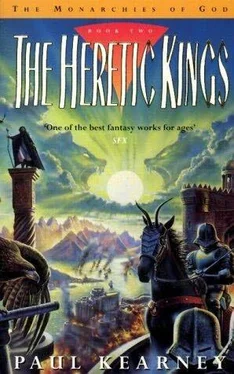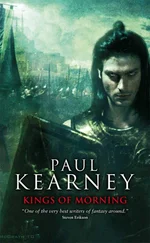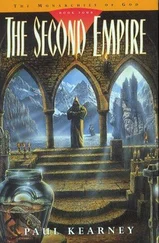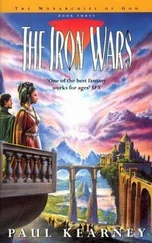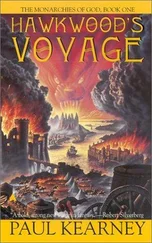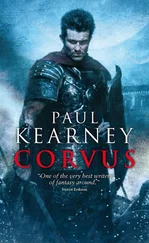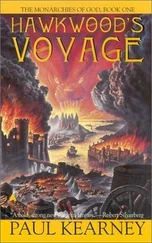Paul Kearney - The Heretic Kings
Здесь есть возможность читать онлайн «Paul Kearney - The Heretic Kings» весь текст электронной книги совершенно бесплатно (целиком полную версию без сокращений). В некоторых случаях можно слушать аудио, скачать через торрент в формате fb2 и присутствует краткое содержание. Жанр: Фэнтези, на английском языке. Описание произведения, (предисловие) а так же отзывы посетителей доступны на портале библиотеки ЛибКат.
- Название:The Heretic Kings
- Автор:
- Жанр:
- Год:неизвестен
- ISBN:нет данных
- Рейтинг книги:3 / 5. Голосов: 1
-
Избранное:Добавить в избранное
- Отзывы:
-
Ваша оценка:
- 60
- 1
- 2
- 3
- 4
- 5
The Heretic Kings: краткое содержание, описание и аннотация
Предлагаем к чтению аннотацию, описание, краткое содержание или предисловие (зависит от того, что написал сам автор книги «The Heretic Kings»). Если вы не нашли необходимую информацию о книге — напишите в комментариях, мы постараемся отыскать её.
The Heretic Kings — читать онлайн бесплатно полную книгу (весь текст) целиком
Ниже представлен текст книги, разбитый по страницам. Система сохранения места последней прочитанной страницы, позволяет с удобством читать онлайн бесплатно книгу «The Heretic Kings», без необходимости каждый раз заново искать на чём Вы остановились. Поставьте закладку, и сможете в любой момент перейти на страницу, на которой закончили чтение.
Интервал:
Закладка:
But the horsemen could not keep up their advance. Corfe’s men seized their lances and dragged them out of the saddle, stabbed upwards into armpit and groin or slashed the tendons of the horses so the screaming creatures went down kicking madly, crushing their riders. And once a rider was on his back, it was impossible for him to get up again. The heavy armour kept him pinned in the muck until a gleeful tribesman ripped off his helm and cut his throat.
It was over quickly. The cavalry line was broken into knots of milling riders who were in turn engulfed and brought down. A score of pain-crazed horses galloped riderless down the hill along with a few lancers who had somehow kept in the saddle and flailed their mounts into a canter.
“Reform!” Corfe shouted. And his men paused in their looting of the dead to dress their ranks and straighten the line.
“Double!”
The formation jogged on again. Corfe had no idea how many casualties his little army had suffered, but that did not matter. What was important was that they catch the rest of the rebel forces before they deployed.
His armour seemed light now. He had not struck a blow during the swift, brutal skirmish, too busy trying to direct things, to keep an eye out for the larger picture, to gauge the need for the reserve under Marsch. Now the battle energy was flowing in him, the cold strength that entered into every man at the imminent prospect of death. The tribesmen advanced downhill at a flat run, and this time Corfe heard them break out into the shrill, unearthly wail that was their battlecry.
A mob of men before them, some dressed in line, some crowded in a shapeless mass. There was the bristling array of a pike tercio, the long, wicked weapons swinging down to present a fence of spikes to the attackers. Corfe’s command charged into the enemy.
The rebels were pushed into a tighter mass almost at once as the men at the forefront of the formation recoiled. Here and there a company got off a rattle of volley fire, but for the most part isolated arquebusiers were loading and firing at will. Maybe the duke had died in the cavalry battle, Corfe thought; there seemed to be no leadership beyond the officers of individual tercios.
Only the tercio of pikemen kept their ranks. The tribesmen beat down the long weapons with their swords and tried to pierce the formation and disrupt it, but rear ranks of the enemy brought their own pikes down over the shoulders of their comrades and impaled the impetuous attackers. Corfe’s men were pushing back the disorganized mobs of rebels elsewhere, but were taking heavy losses against the pikes.
Corfe fought his way out of the scrum until he was at the rear of his men. Marsch was waiting there with the reserve, his eyes aflame with impatience.
“Come with me,” Corfe shouted at them, and led them off at a sprint.
He took them along the back of the battlefront, around the enemy flank. They met a company of arquebusiers there, placed to guard against such a move, but they were among them before the enemy could let off a volley, hacking and stabbing like scarlet-clad fiends. The arquebusiers broke and fled into their camp. Corfe led his men onwards, through the outer tents of the rebel encampment, the tribesmen kicking through fires and slashing guy-ropes as they went.
They were in the enemy rear. Incredibly, no one had posted a reserve here. The pike phalanx bristled like a vast porcupine ahead of them, Corfe’s men still throwing themselves on the pike points and striving to beat them down.
“Charge!” Corfe screamed, and led his hundred forward into the rear of the pikes.
The enemy had no chance. Impressive though pikemen might be in formation, once their ranks were broken they were impotent, their unwieldy weapons a handicap. Corfe’s reserve tercio slaughtered them by the score, shredding their formation to pieces.
The battle was won. Corfe knew that even as the rebels were fighting to break away from this twofold assault. The rebel army had become a mob, losing any vestige of military organization. It was simply a crowd of men struggling to save themselves, with the scarlet demons of Corfe’s warriors cutting them down like corn as they ran.
“I give you joy of your victory, Colonel,” Andruw said, meeting Corfe in the midst of that mass of murder. “As pretty a move as I’ve ever seen, and these men of ours!” He grinned. “There must be a virtue in savagery.”
Victory. It tasted sweet, even if it was over fellow-Torunnans. It was better than wine or women. It was an exaltation which burned away self-doubt.
“Keep up the scare,” he told Andruw. “We’ll pursue them all the way to Hedeby if we have to. They mustn’t be given a rest, or a chance to reform. Keep at them, Andruw.”
Andruw gestured to the howling, slaughtering tribesmen who were following the retreating army and turning their rout into a murderous nightmare.
“I don’t think I could stop them if I tried, Corfe.”
By nightfall it was over. Hedeby’s citadel had been surrendered by the town headsman, the nobility of the place having been killed in the battle. Corfe billeted his troops in the castle itself. The remains of Duke Ordinac’s forces were scattered refugees, lost somewhere in the surrounding countryside. Many had surrendered in the town square, too exhausted to flee any farther. These were imprisoned in the castle cells. The people of the town, in terror of the bloody, weirdly armoured barbarians in their midst, refused them nothing in the way of food, drink, or anything else they had a mind to take, though Corfe issued stark orders against any maltreatment of the citizens. He had seen too much of that at Aekir to countenance it from men under his own command.
Four hundred of the duke’s men had died on the field, and another tenscore were bleeding and screaming wounded, most of whom would follow their dead comrades into eternity. Corfe’s men had lost less than a hundred, most of the casualties being incurred by the tercio which had engaged the enemy pikes head on.
Ordinac kept a good larder, and there was a feast for those well enough to stomach it that night, the tribesmen drinking and eating at the long tables of the castle hall, waited on by terrified serving attendants-Corfe had seen to it that these were male-and recounting the stories of what they had personally done in the battle lately fought. It was like a scene from an earlier, cruder age, when men put glory in battle above all other things. Corfe did not greatly care for it, but he let the men have their fun. They had earned it. He was amused to see Ensign Ebro flushed and drinking in the midst of the rest, being slapped on the back and not resenting it. Clearly the relief of having seen out his first battle without disgrace had unbent him. He was roaring with laughter at jokes told in a language he could not understand.
Corfe went out of the smoky hall to stand on the old-fashioned battlements of Hedeby Castle and look down on the town and the land below, dark under the stars. Up on the hill overlooking the town there was a dull red glow. The townspeople had dragged the bodies of the slain there on Corfe’s orders and made a pyre of them. There they lay, Torunnan men-at-arms and duke and Felimbric tribesmen, all burning together. Corfe thanked his luck that his men did not seem to require elaborate burial rites. As long as the corpse burned with a sword in its hand, they were happy. Such strange men; he had come close to loving them today as they followed him without question or hesitation. Such loyalty was beyond the fortunes of kings.
Footsteps behind him, and he found himself flanked by Andruw and Marsch, the tribesman clutching a flaccid wineskin.
“Drunk already?” Andruw asked, though he might have asked the same question of himself.
Читать дальшеИнтервал:
Закладка:
Похожие книги на «The Heretic Kings»
Представляем Вашему вниманию похожие книги на «The Heretic Kings» списком для выбора. Мы отобрали схожую по названию и смыслу литературу в надежде предоставить читателям больше вариантов отыскать новые, интересные, ещё непрочитанные произведения.
Обсуждение, отзывы о книге «The Heretic Kings» и просто собственные мнения читателей. Оставьте ваши комментарии, напишите, что Вы думаете о произведении, его смысле или главных героях. Укажите что конкретно понравилось, а что нет, и почему Вы так считаете.
